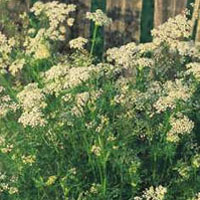Caraway
 © Martin Wall
© Martin WallParts Used & Where Grown
Caraway is a biennial that is widely cultivated throughout the world, and is native to Europe, Asia, and North Africa. The dried ripe fruit or seeds are used medicinally.1
- Reliable and relatively consistent scientific data showing a substantial health benefit.
- Contradictory, insufficient, or preliminary studies suggesting a health benefit or minimal health benefit.
- For an herb, supported by traditional use but minimal or no scientific evidence. For a supplement, little scientific support.
Our proprietary “Star-Rating” system was developed to help you easily understand the amount of scientific support behind each supplement in relation to a specific health condition. While there is no way to predict whether a vitamin, mineral, or herb will successfully treat or prevent associated health conditions, our unique ratings tell you how well these supplements are understood by the medical community, and whether studies have found them to be effective for other people.
For over a decade, our team has combed through thousands of research articles published in reputable journals. To help you make educated decisions, and to better understand controversial or confusing supplements, our medical experts have digested the science into these three easy-to-follow ratings. We hope this provides you with a helpful resource to make informed decisions towards your health and well-being.
This supplement has been used in connection with the following health conditions:
| Used for | Amount | Why |
|---|---|---|
Irritable Bowel Syndrome (Peppermint Oil) | 90 mg of peppermint oil plus 50 mg of caraway oil in enteric-coated capsules taken three times per day | Taking peppermint oil combined with caraway oil may reduce wind production, ease intestinal cramping, and soothe the intestinal tract. |
Gingivitis (Chamomile, Clove Oil, Echinacea, Menthol, Molmol, Peppermint, Sage) | 0.5 ml in half a glass of water three times per day swished slowly in the mouth before spitting out | A mouthwash containing sage oil, peppermint oil, menthol, chamomile tincture, expressed juice from echinacea, myrrh tincture, clove oil, and caraway oil has been used successfully to treat gingivitis. |
Indigestion, Heartburn, and Low Stomach Acidity | 50 mg of oil plus 90 mg of peppermint oil in enteric-coated capsules taken three times per day for indigestion only | One trial found that a combination with peppermint, caraway, and fennel was useful in reducing wind and cramping in people with indigestion. |
Irritable Bowel Syndrome (Fennel Seed, Peppermint, Wormwood) | Refer to label instructions | A combination of peppermint, caraway seeds, fennel seeds, and wormwood was reported to be an effective treatment for upper abdominal complaints in one trial. |
Colic | Refer to label instructions | Caraway relieves intestinal cramping and, in this way, may ease symptoms of colic. |
Halitosis | Refer to label instructions | Volatile oils made from caraway have anti-bacterial properties and may be effective in mouthwash or toothpaste form. |
Traditional Use (May Not Be Supported by Scientific Studies)
The use of caraway as a medicinal agent has remained unchanged for centuries. Its use as a digestive aid was first mentioned in the Egyptian Eberus Papyrus about 1500 B.C.2 In Shakespeare’s Henry IV, the character Falstaff is invited to have a serving of baked apples and caraway to aid the digestion and relieve wind.3 Nineteenth-century American Eclectic physicians (doctors who recommended herbs), such as Harvey Felter, pointed out the seeds not only promote digestion but also ease the symptoms of children suffering from digestive colic.4
Copyright © 2024 TraceGains, Inc. All rights reserved.
Learn more about TraceGains, the company.
The information presented by TraceGains is for informational purposes only. It is based on scientific studies (human, animal, or in vitro), clinical experience, or traditional usage as cited in each article. The results reported may not necessarily occur in all individuals. Self-treatment is not recommended for life-threatening conditions that require medical treatment under a doctor's care. For many of the conditions discussed, treatment with prescription or over the counter medication is also available. Consult your doctor, practitioner, and/or pharmacist for any health problem and before using any supplements or before making any changes in prescribed medications. Information expires December 2024.



 We are proud to announce that
We are proud to announce that  As the market evolves, customers increasingly request a wider variety of omega-3 options for their lipid...
As the market evolves, customers increasingly request a wider variety of omega-3 options for their lipid...  Maintaining healthy glucose levels is crucial for preventing metabolic conditions like diabetes,...
Maintaining healthy glucose levels is crucial for preventing metabolic conditions like diabetes,...  Looking at formulating a new vitamin blend? Discover
Looking at formulating a new vitamin blend? Discover 







































